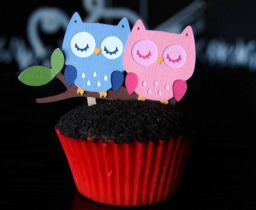
Of Cupcakes and Crania
What is is? ––Platheus
Twilight sat, enraptured. She’d made a visit to Sugar Cube Corner. She’d bought a cupcake. She should have been eating it right now. Why wasn’t she? It wasn’t that she didn’t like cupcakes, or that she didn’t want to eat the confection before her, she just… didn’t. She had a cupcake. She was not eating it.
It sat there on the table, unscathed.
Perfect.
But not for long…
It was laughable, really, how much work one put into something solely intended for annihilation. Annihilation that almost anyone could bring. You didn’t have to be strong, or a powerful unicorn, or clever, or anything. A foal could do it, the task was that simple.
It was brutal.
How could it possibly be right to destroy something so magnificent? So flawless, so…
Beautiful.
But that wasn’t really it, was it? It couldn’t be. Because, if one could prove that it was inherently wrong to destroy a thing because it was beautiful, what were the implications? If something has value based solely on beauty, then who was to say what is beautiful, because Beauty is relative. And if something was worth saving because it was pleasing to one being, one entity’s idea of Beauty, then would not the converse be true as well? Or, actually, the inverse–– titles are important. If something is beautiful, then it is worth saving, says the base postulate. Ergo, according to the inverse of the statement, if something is not beautiful, then it is not worth saving. But then, the argument is drawn into a noose, because Beauty is relative.
But what, then, was worth saving? If Beauty is relative, and relatives are not universally true, then did Beauty cease to exist? And if there was no beauty, then there was nothing worth saving. Or was there? It required deeper thought.
According to the laws of logic, if the inverse of a statement is true, then the converse of the same statement was also true. Thus, if something is not worth saving because it is beautiful, then the converse of the original statement was logically true: If something is worth saving, then it is beautiful. Or, to frame it in the somewhat clearer contrapositive, if something was not worth saving, then it was not beautiful.
She blinked. This was astounding! The implications… her old professor seemed to speak in her mind.
The contrapositive of a true statement is always true.
This lent a whole new light to the concept. Was something beautiful worth saving? All her senses seemed to scream ‘yes!’. But logic was not to be ruled by the senses.
She tried inductive reasoning. What were some beautiful things? A book, she decided. A historical book was beautiful. Was it worth saving? Of course it was. The same held true for a library, a relic, and Canterlot Castle. So according to inductive reasoning, she was right.
Whatever it was she was trying to be right about…
But inductive reasoning cannot prove. It has its uses, such as prediction and astronomy, but unfortunately, at the end of the day, it was deductive reasoning that could actively narrow down the options until there was only one possible truth to be had.
She smiled. She was actually enjoying this.
Performing the mental equivalent of cracking her knuckles (handy, when one has no crackable knuckles physically), she carried on. Was something beautiful to be destroyed? Certainly not! Was it, then, to be left alone? She ruled out the question as invalid. The issue was not whether Beauty ought to be meddled with, it was whether it ought to be preserved or not. So, the only other option was that Beauty must be saved. And as she had ruled out every other possibility, she concluded the last to be correct. Beauty must be saved at all costs.
Of course, it all came down to one’s idea of beauty…
Nightmare Moon had been beautiful, in her own way. So had Chrysalis, if you liked that sort of look. Discord… eh, Discord had been compliant to Logic, at least. He was hideous. And there lay her chief quandary. If they had all been ugly, then she could have considered it evidence for her theory. But as they had been a mixed lot, it was inconclusive.
Of course it all… came down… to one’s… idea… of Beauty…
What is Beauty?
According to logic, it was not because a thing was beautiful that one saved it, it was because one saved it that it was beautiful. And if it was because one saved something that it was beautiful, then nothing in itself was beautiful. All things must be given beauty. But who had the right to do that? Certainly no mortal pony. Perhaps the princesses? Surely any creature as beautiful as they would have the sovereign right to declare a thing beautiful or not. If indeed they could, then the problem was solved–– one need only consult the princesses for verification or refutation of his or her beauty, or even the beauty of an object.
However, there was a flaw.
The whole theory hinged on the verity that the princesses were in fact beautiful. But according to the basis of the theory itself, the very postulates it was built around, beauty was not innate. It was bestowed rather than intrinsic. And if it was bestowed, there must always be a Bestower. And if there must always be a Bestower to grant beauty, then nothing that could not be given Beauty by some higher entity could be beautiful. Since the princesses were the highest entity in the equation, they could not have anything endowed upon them by any higher entity, because there was no higher entity to be had. Thus, they could not in any way be granted Beauty, and as a result, they could not be beautiful themselves. Hence, while they might feasibly hold the power to consign Beauty to a being or object, they could in no way they could attain said power because it had not been given to them. In consequence, they must not have the ability to link Beauty to anything, because they can in no way grant what they do not have.
Twilight gasped, clearly shaken.
What then? If the princesses themselves could not give this precious tag, who could? In any circumstance, the outcome of logic will always be the same: Beauty must be allocated by a higher entity, the higher entity must be beautiful itself, and so it must have received its Beauty from a yet higher entity. The cycle may wind its way up through yet more levels as higher and higher entities grant lower entities this gift, but logic can only result in one outcome: a paradox. Beauty is not innate, therefore it must be granted. But it must ultimately be granted by one who is innately beautiful.
The unicorn shook her head, trying to understand. What had she proved? What had she done?
Was there then no Beauty? If Beauty was a concept or an idea which could only be granted by a higher power, and if said higher power had no way of becoming beautiful, and consequently possessing no way of transferring, ceding, or attaching that essence to another, then either Beauty must not exist, or else Logic itself was fallible. And if Logic itself was fallible, then… it was impossible for anything to make sense. And if nothing made sense…
What could she possibly reason with? In the absence of Reason, what was left? All things must fall into a state of disorder, but disorder could only exist because there was order! And because logic is the essence of Order, could there be any order without Logic?
The implications, the implications!
She heard her professor in her head again, speaking from the past to a young filly who wanted answers, who wanted to understand.
You must always remember, Twilight, that logic is the basis of all we know, all we are. If there is no logic, there can be no reason. If there is no reason, there can be no truth. And if there is no truth, then we can not exist, because existence is the essence of truth.
She remembered being assured. She remembered the confidence she’d taken on, knowing that there were absolutes, knowing that things must exist, that they must be true. Because some things were so logical they couldn’t be explained using Logic.
You exist, Twilight Sparkle. You are Logical. You are True.
Logic. Truth.
Logic is Truth. Truth is Logic.
What is logical must be true. What is true must be logical.
Ponyfeathers, it made Sense.
And yet…
Was there no Beauty? Or perhaps…
Is Logic beauty? she wondered. Is Logic-Truth the basis of all things, including Beauty? For that matter, is Beauty Logic?
True Beauty, ponies said. Maybe that was what it meant. She didn’t want to think about it, but she couldn’t not think about it. It just seemed Right, somehow.
Ah, of course. Had to drag Right into it. And if it was a question of what was Right…
She realized she hadn’t blinked in minutes.
She blinked.
She blinked and straightened up.
Somepony was knocking at her door.
…
Celestia, somepony was Knocking At Her Door!
She bolted up, causing a few papers to flutter to the floor as she hurried to the portal. She opened it.
It was Rarity.
“Oh, hello, Rarity,” she said, opening the door all the way and standing to one side.
“Hello, Twilight,” Rarity said. She stepped inside. “Isn’t it a beautiful morning?”
Twilight cocked her head.
A beautiful morning, Rarity said.
Perhaps we could all try minding our own business, for a change, her professor whispered in her head.
A beautiful morning. Yes, yes it was.
She smiled. “Absolutely! Come on inside.” She turned around and started walking inside, then stopped. “Hey, Rarity,” she said.
“Care for a cupcake?”

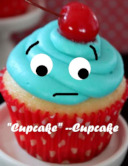
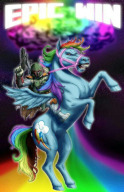



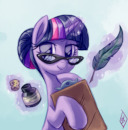
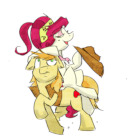
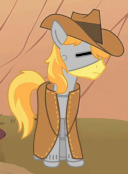
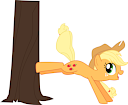







assets0.ordienetworks.com/images/GifGuide/clapping/taxidriver.gif
what is this i don't even
(Very good. I'm a sucker for these kinds of weird psychological mind-trips, and you pulled this off awesomely.)
but seriously, what.
Wat.
Your amazing use of LOGIC astounds me, good sir. I really like your style for this story and would like to see you use it more often. Keep writing brilliance!
Thanks everypony :D
I just have to say this just once that this story made me thought of: If Twilight and Spock were in the same room, they would talk days on end about logic.
1605529 Well, my personal preference would be to have Spock and Pinkie Pie discuss logic, but... May you live long and prosper.
Twilight. You are drunk. Go home.
fancancer.files.wordpress.com/2011/11/77585-caption-drunk-macro-no_im_not_drunk-pinkie_pie-twilight_sparkle.jpg
So what we have concluded is that Logic=Beauty. Therefore, the only beautiful things are logical things. Also, going from the Order and Disorder cannot exist without the other, which is true, Twilight should eat the cupcake, which would be an act of disorder, in order to continue the existence of Order.
And this is why philosophy hurts brains.
1615069 But she conserved the space-time continuum of Logic and Order by neutralizing the situation and giving the cupcake to Rarity. Epic save!
Epic save!
brilliant have a moustache
also this 1392429
I want to see something like this between Pinkie and Twilight. What could go wrong?
1618523 There's a story out there called "Pinkie Pi" you might enjoy, if you haven't read it already. Or even if you have, you probably still would. I'd link it, but I'm too bushwhacked.
1621146 Didn't know about it, I'll give it a look.
1623254 It's really good. Better than my scribbles.
>Somepony was knocking at her door.
>…
>Celestia, somepony was Knocking At Her Door!
This is the second time I ever laughed out loud because of capitalization. The first one being, y'know, helping uncle Jack off his horse.
Great story overall. Insanely silly, but great.
I'm sorry Twilight, but your logic is fundamentally flawed. For you see objectivity, in itself, is subjective. Without an onlooker to purpose what an objective standpoint is, an object, situation, emotion, etcetera simply exists. A waterfall will continue to be a waterfall as long as conditions permit it to continue being a waterfall. Only until an onlooker comes to the conclusion that a waterfall is beautiful will it become beautiful. Another point that sticks out to me like a sore thumb is that there are absolutes. This is entirely false as you have demonstrated. A statement that revolves around circular logic is immediately Illogical. Statements based on circular logic will ultimately result in a paradox as you have also demonstrated. Paradoxes, by nature are illogical by nature, so therefore the statement that the paradox was based on was also illogical.
On another note, absolute statements also ignore context. For example, would you save a beautiful thing if it was to cause you harm.A poison joke flower may look beautiful, so according to your absolute statement, it too must be saved.
We are the ones who color our own existence. Objectivity is simply a standard set by our own subjective view of our existence. There is no such thing as absolute.
tl;dr PHILOSOPHY LOLOLOLOLOL!
1692804 *cracks knuckles* Well, if you'd just...
Rewrite that, please? With some paragraph breaks and punctuation? This seems like a really fun "argument" I'd really enjoy to continue, if you'd like.
.1627516 Ah yes, the EQD gig. I'd have submitted this for them to reject, but it's not long enough. But seriously, yes. Cereal, Seth & Co are hilarious!
P.S lets talk about this some time ok?


From: SHON the
By the way science and philosophy are sociological constructs and perspectives.
I've just had a problem with Converse, Inverse and Contrapositive.
Statement: If it rains, then the soil will get humid.
- Hypothesis: It rains.
- Conclusion: The soil will get humid.
Inverse: If it doesn't rain, then the soil won't get humid. (INCORRECT)
Converse: If the soil gets humid, then it rains. (INCORRECT)
Contrapositive: If the soil doesn't get humid, then it doesn't rain. (INCORRECT)
WHAT AM I TO MAKE OF THESE!?
6514861 Ah, it's something I probably should have clarified when I wrote this...when I was younger...
Logically speaking, contraposition means that a logical statement and its contrapositive are logically equivalent. In formulaic terms, the contrapositive of conditional statement A → B is ¬A → ¬B. This means that a conditional statement must be constructed in a manner which reduces it to the basic definitions of its every tenet. Moreover it must contain enough quantifiable veracity to be reasonably sound. The problem with your conditional statement "If it rains, then the soil will get humid" is that, although it might be unidirectionally accurate in the sense that it accounts for the correlation of two events, it does not secure itself by reciprocal definition to its adjacent theses. This makes it useful as a scientific experiment on multiple causations of humidity in soil, but not as an exercise in philosophy.
A common way of visualizing logical equations is through the use of Venn diagrams. The brilliance of a Venn diagram is that it shows the hierarchy of categories necessary to postulate the knowable regions of truth about the universe. Take, for example, the statement "All bananas are fruit." Here we have the object (banana) and the measurable category to which it belongs (fruit). We are therefore able to reassemble the assertion into a conditional statement, "If something is a banana, then it is a fruit" and its observably true contrapositive, "If something is not a fruit, then it is not a banana." This effect can of course be seen with a variety of examples.
Allow me to point out a common mistake in assembling a conditional statement, and that is confusing position of category and object. We start with the simple phrase, "Unicorns have horns" and proceed to the conditional statement, "If something has a horn, then it is a unicorn." Well, obviously this is false, because minotaurs have horns and they're not unicorns, so the contrapositive must be false as well: "If something is not a unicorn, then it does not have a horn." The problem here is phrasing. Had we said "If something is a unicorn, then it has a horn" then we would have seen a more accurate contrapositive: "If something does not have a horn, then it is not a unicorn." It's a slight deviation to note this, but it's important to mention that by claiming all unicorns have horns it does not follow that a unicorn who has lost his horn is no longer a unicorn in essence. What the conditional statement attempts to set is the nature of a unicorn, not the legal definitions of a thousand eventualities. It is perhaps better to say "If something is a unicorn, then it is in concordance with its nature to have a horn." In any event, the main point is that in our statement "If something is a unicorn, then it has a horn," we have placed unicorns into a small Venn circle within a defined category, which would be represented by the larger Venn circle, "Things With Horns."
By proposing your statement, "If it rains, then the soil will get humid," as a conditional statement subject to logical analysis, you have placed made your object the rain, and placed it in the category of Things That Happen When The Soil Gets Humid. This is a roller coaster with only half a track, because both parts of your conditional statement can be influenced by a multitude of outside factors. The reason why your contrapositive fails the test of veracity is because the original statement is flawed logically--it fails to define itself in both directions. So you see that in order for a statement to work well within the confines of logic, it must not only be quantifiably true, it must also fit the criteria set forth by the order that logic requires.
I hops that helps, cheers!
--Squiddy
6522139 I bet it will; I'll just read it all tomorrow 'cuz I got a test tomorrow. Gotta study today.
8237563
This story is five years old; my only question is, how did you happen across it?